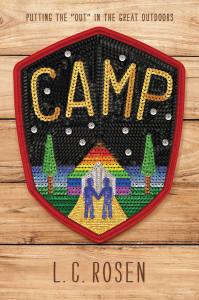There’s No Right Way to Be Queer

In my new book Camp, a romantic comedy that takes place at a queer summer camp, the campers have a once a week queer history lecture. One of these is about The Mattachine Society and the Daughters of Bilitis, two pre-Stonewall queer activism groups who have been active in the US since the 40s and 50s. There’s a story that’s told and which is told in the book, of a lesbian, who wore jeans and leather jackets. But the Mattachine Society and Daughters of Bilitis didn’t like that. They thought assimilation was the best way to achieve equality. They took the woman dress shopping. They bought her heels. The first meeting she walked successfully in heels, they all applauded. The kids in my book all agree this is bad, but they wonder about Hudson, the protagonist’s boyfriend, who describes himself as Masc4Masc – someone who acts “masculine” and is only interested in men who do likewise. The protagonist, Randy, a theater kid with a love of nail-polish and unicorns, has decided to win Hudson’s heart by playing the ultimate role – “masculine.” He hopes Hudson will fall in love with him, and then he can go back to being himself. But he wonders, after hearing about the applause for the woman in heels, is Hudson liking “masculine” guys a preference, or something deeper? Does he think “feminine” guys are somehow below him?
I’m not going to tell you how it all works out, of course. You need to read it yourself. But these are the conversations queer kids have today, the things they worry about. Do people want them to put on the heels? Or can they be themselves and just wear the jeans? To me the answer is obvious: no one should think you’re a better person because you can walk in heels. But for queer teens being told by a straight world that heels are better, it’s not so clear.
In my last book, Jack of Hearts (and other parts) (out in paperback on May 26th with new bonus content) was a sex-ed thriller that tackled both queer sex -ed and the way straight society tells queer teens that they needed to be chaste, uncomplicated and eventually paired off in ways that straight readers find adorable. I’ve talked about how that fetishizes queer teens and when queer teens only see themselves in narratives that fetishize them, they start to fetishize themselves, which takes away their chance to grow into real people.
But Camp is about the ways queer teens internalize homophobia. About the “special gay” – that kid who nervously comes out to his parents, and they say “oh, don’t worry, we love you, cause you’re our son – it’s those other queers we don’t like. The ones in the parades, dancing in their underwear. Why do they have to be so in your face? Why do they have to act so weird?” The special gay is the gay kid who doesn’t mind being gay, as long as he’s the right type of gay – and he internalizes that, takes it out on other queer people. “They give us a bad name,” he’ll say. “They should be like me and Mayor Pete. Being Gay doesn’t mean being an oversexed femme boy dancing around in his underwear having lots of sex with strangers.” Jack was about straight society telling a queer boy that. But what happens when a queer boy believes it?
Homophobia doesn’t always look like a preacher holding up a sign saying “sodomites burn in hell.” Homophobia often looks like “I love the gays, but that one is a bit much isn’t he?” It’s a gay person saying to another gay person “You’re giving us a bad name.” That’s homophobia, too. Telling queer people they have to be a certain kind of queer – even if you’re queer – is homophobia. And so many queer teens internalize this stuff. They’re trying to figure out who they are, how their queer identity is part of their broader identity, and many try to suppress anything that might be read as “too gay” because they know that then straight people will brush them off as mere stereotypes. We build identities around what straight people will think of us, carefully constructing a façade that will make them like us, or at least not reject us. Especially our parents, and adults around us. Books like Jack of Hearts and Camp, I hope, will offer an alternative view: screw what other people think of you. Screw the “right way to be gay.” Be whoever you want to be. It’s a message we tell straight kids all the time. But for some reason when we tell queer teens to be whoever they want, we always have a caveat or two. As a queer man, I want to take those caveats back. I want to show queer teens that they get to choose about who they want to be for themselves, not for anyone else, and all the choices – jeans, heels, both, neither – are theirs for the taking.
